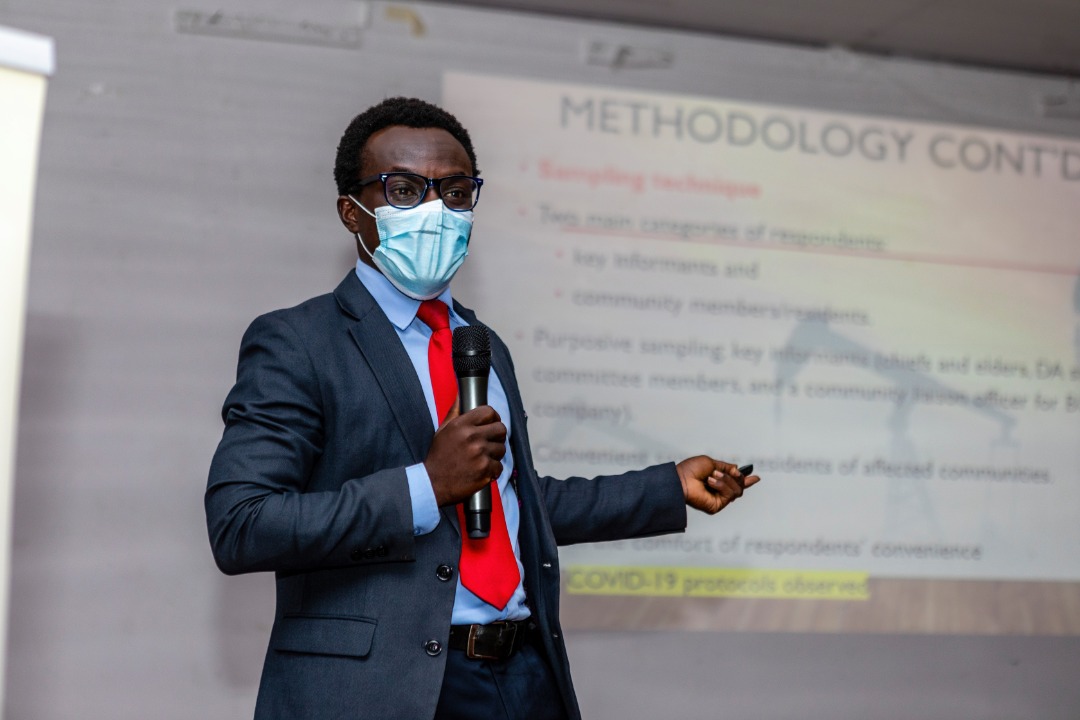GNPC Cited For Human Rights Violations…….During Oil Exploration in Atebubu-Amantin, Nkoranza North & South Districts
Story by: Ato Keelson
A study on onshore petroleum exploration in Ghana by Wacam has revealed gross human rights violations and disregard for the principle of Free Prior and Informed Consent (FPIC) by oil and gas explorers working for the Ghana National Petroleum Corporation (GNPC).
This was disclosed at a Responsible Mining Forum on Promoting Community Participation in Mineral Resource Exploitation organised by Wacam, a community-based human rights and environmental mining advocacy, in Accra last Wednesday.
Giving an overview of the study dubbed: “Onshore Petroleum Exploration in Ghana: A Study on Community Rights”, one of the two researchers who undertook the study, a Lecturer at the University of Education, Winneba (UEW), Dr Yaw Asamoah, revealed that food baskets communities such as Atebubu-Amantin, Nkoranza South and Nkoranza North where there is ongoing onshore oil exploration, engagements by agents of GNPC with those affected communities did not meet the minimum standards of the FPIC protocols.
He added that purposive sampling by key informants such as chiefs, elders, district assembly staff members and assembly members showed that there was low to no level of community participation against the principle of self-determination which was an International Covenant on Civil and Political Rights and the International Covenant on Economic and Social Cultural Rights.
“There was inadequate implementation of the Principle of FPIC so they cannot demand adequate compensation for their losses or request further conditions for the consent given and even demand that the project be stopped at any time they assess that the exploration is not in their interest,” Dr Asamoah emphasised.
Dr Asamoah further revealed that in communities in Beposo, for instance, though there exploration agents told the residents they were in to lay tracks or construct roads for them, they later saw that their farms were rather being destroyed for exploration purposes.
The study, according to him, revealed that compensation promised farmers were also not paid in full in utter disregard for the FPIC, adding that an act by the explorers which shocked the communities as was narrated by an assembly man was the fact the borehole that the explorers dug which provided water to the community was destroyed and the pipes disconnected before deserting the community unceremoniously.
“Majority of the respondents perceived the exploration to be either close to their livelihood or their communities. A minority of respondents perceived the exploration to have negatively affected their social and economic rights,” the study stressed.
In the light of the above, the study recommended that district assemblies and civil society orgnisations (CSOs) should conduct public education campaigns within the Voltanaian basin.
“The FPIC process must be implemented fully by project proponents to ensure the communities are given adequate and factual information about the project, they are allowed to either give or refuse their consent freely and when the consent is given to determine the conditions under which the consent was given and the authority to withdraw their consent at any point of the project implementation.”
“…In the situation where people’s property or crops are going to be destroyed by the project, the proponent should negotiate and come to an agreement with the owners /farmers before the property is finally destroyed,” the study concluded.
Touching on the objective of the study, Dr Emmanuel Yamoah Tenkorang who is Dr. Emmanuel Yamoah Tenkorang, Dean, School for Development Studies, University of Cape Coast, on his part, revealed that the study was to investigate the level of participation of communities based in the ongoing exploration, investigate awareness of the affected communities about their human rights in the ongoing exploration.
He added that the study also examined how well the principle of FPIC has been sought in the exploration process as well as explore the extent to which social license has been granted to the GNPC in the exploration process.
“Gaining and maintaining a social license to operate is becoming a necessary part of doing business and that operating without the support of the local communities can lead to violence, litigation, operational delays, project closure of both financial and human loss,” Dr Tenkorang emphasised.
Interestingly, the researchers indicated that several efforts were made to reach GNPC for their reaction but all to no avail.
The Associate Executive Director of Wacam, Mrs Hannah Owusu-Koranteng, in an address said the 6th Annual Conference of Wacam at GNAT Village at Ejisu-Abankro near Kumasi in the Ashanti region a few weeks ago, raised very important issues relating to mining including the ongoing oil and gas exploration in the Atebubu-Amantin, Nkoranza North and Nkoranza South Districts.
According to her, the issue which dominated discussions was the cosmetic or absence of community participation in the processes to seek the consent or what is professionally described as the Social License of Communities in the event of mining including oil and gas.
“In some situations the state employs the use of force to compel the host communities to accept mining projects and to bear the brunt of all the negative effects of the mining projects whilst the proponents of such projects who live outside the project areas do not experience the long term social and environmental harm to the host communities,” Mrs Owusu-Koranteng stressed.
She added that “it is in this spirit that communities who attended the 6th Wacam Annual Conference developed a strong message to policy makers that “Nothing About Us Without Us”.”
She explained that the mining communities and areas of possible oil and gas exploration were sending a message that they expect government to respect the FPIC in engaging with the community people.
The associate executive director of Wacam later bemoaned the actions of the agents of GNPC in Atebubu-Amantin, Nkoranza North and Nkoranza South as was captured by the research where they disregarded the standards of the FPIC protocols.
“If we get the foundation wrong in the community consent processes with respect to onshore oil exploration we are bound to reap the same result of conflicts, human rights abuses, environmental pollution, social and cultural disintegration which has been associated with gold mining and mining operations in the country. We should avoid this trajectory associated with gold mining and exploration,” Mrs Owusu-Koranteng cautioned.
She, therefore, appealed to government to begin the implementation of the FPIC principle in the new areas of mining operations, especially communities that would be affected by on shore oil production.
Source: www.thenewindependentonline.com








